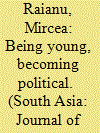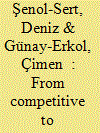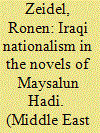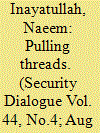|
|
|
Sort Order |
|
|
|
Items / Page
|
|
|
|
|
|
|
| Srl | Item |
| 1 |
ID:
190729


|
|
|
|
|
| Summary/Abstract |
This article discusses the relationship between political subjectivity and urban space in three novels written in the immediate aftermath of the Partition of India: Qurratulain Hyder’s My Temples, Too, Mumtaz Shah Nawaz’s The Heart Divided and Yashpal’s This Is Not That Dawn. Despite extensive thematic and structural similarities, these early Partition novels have never been considered together and through a historical lens. Each narrative features moments of reckoning when the young protagonists are faced with sudden demands to become political in a new way, for example by abandoning secular anti-colonialism for communitarianism. The diversity of their experiences and responses, from bitter resignation to open-ended struggle, reflects the difficulties of constructing unitary selves expressing deep interior convictions aligned with collective identities. These transformations of political subjectivities are situated in and shaped by the heterogeneous urban spaces of Lucknow and Lahore, which establish the conditions of possibility for coexistence and its limits.
|
|
|
|
|
|
|
|
|
|
|
|
|
|
|
|
| 2 |
ID:
158102


|
|
|
|
|
| Summary/Abstract |
Recent research shows that Turkish society is very polarized and that different identities and ideological perspectives are in constant struggle with each other. In a multicultural society such as Turkey’s, the question of how to think about the relationship between different social groups’ histories of victimization becomes crucial. Following Michael Rothberg’s conceptualization of multi-directional memory – beyond competitive memory, this article presents an archive for comparative work through a data set of novels on the military coups in Turkey. The major argument here is that while these novels are promoting the idea of competitive memory as a zero-sum game, if it is looked at more closely, there are traces of multi-directionality, of ongoing negotiation, cross-referencing, and borrowing. Doing so, it is argued, would help to reframe justice in the society, where different victimizations are not competing with each other, but start to talk to each other. This article is an attempt to create a literary tool of comparison on different stories of victimization as a first step towards transitional justice in a polarized society.
|
|
|
|
|
|
|
|
|
|
|
|
|
|
|
|
| 3 |
ID:
140302


|
|
|
|
|
| Summary/Abstract |
This article discusses the work of Maysalun Hadi, one of Iraq’s most prominent women novelists. Throughout her work, Hadi’s books deal with themes of Iraqi national identity and nostalgia for the glory days of pan-Arabism that are consistent with the country’s pre-2003 ruling Ba‘thist ideology. Yet, reading and analyzing her works offer a more comprehensive and nuanced look at this identity, including a limited acceptance of pluralism along with solidarity with the “Iraqi resistance.”
|
|
|
|
|
|
|
|
|
|
|
|
|
|
|
|
| 4 |
ID:
160119


|
|
|
|
|
| Summary/Abstract |
In recent years there has been a ‘turn’ to thinking about war through the experiences of those touched by it. While this scholarship has generated numerous important insights, its focus has tended to remain on wars’ violences, those responsible for enacting them, and the effects of such violence. In this article, the experiences of pleasure and joy in war that simultaneously take place are placed centre stage. Drawing on three war novels, the article tracks three recurring themes of pleasurable and joyful experiences related to war: bodily pleasures, the ‘togetherness’ of war, and moments of joy that escape war’s reach. Through this focus, war is shown to work across a range of affective registers and as never totalising or universalising in its experience. The article argues that paying attention to joy and pleasure can work to displace war as a focus of analysis, directing attention instead to the experiences of those who live through war and how they survive, sustain, and resist it.
|
|
|
|
|
|
|
|
|
|
|
|
|
|
|
|
| 5 |
ID:
122651


|
|
|
|
|
| Publication |
2013.
|
| Summary/Abstract |
The achievements of Elizabeth Dauphinee's (2013) The Politics of Exile are highlighted by means of two juxtapositions. First, Dauphinee's book invites a contrast to novels because it takes the form of a story. Specifically, Dauphinee's portrait of the vilified 'Serbs' is compared with how the Taliban are treated in Khalid Hosseini's The Kite Runner and Nadeem Aslam's The Wasted Vigil. Second, The Politics of Exile is examined as it emerges from Dauphinee's efforts to overcome the limits of her more academic work. The advantages of Dauphinee's approach relative to our standard research are presented along five dimensions: the responsibility of closure, the purpose of narration, the transparency of the message, how the work is shown, and the role of generosity. This article critiques Dauphinee's silence on the purpose of travel. It closes by suggesting what social theory can glean from The Politics of Exile. Social theorists can learn how to theorize more systematically, to weigh the relationship between the form and content in writing more judiciously, and to probe the deeper purposes of our intellectual life-work more fully.
|
|
|
|
|
|
|
|
|
|
|
|
|
|
|
|
|
|
|
|
|